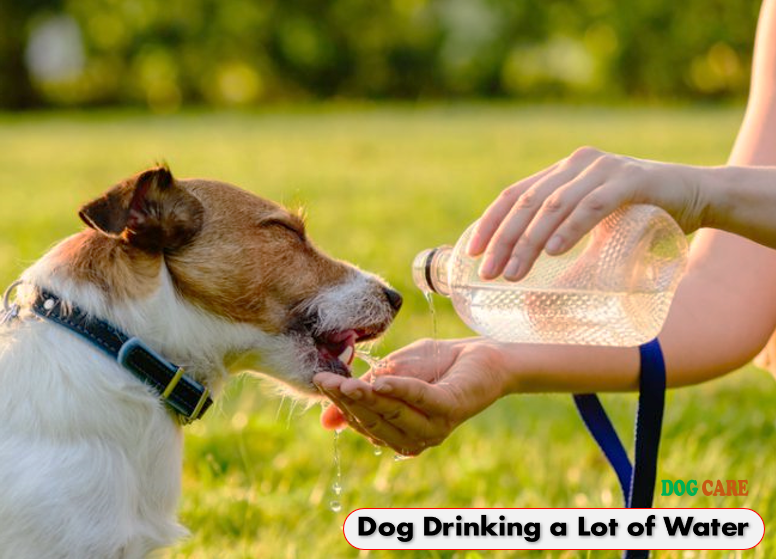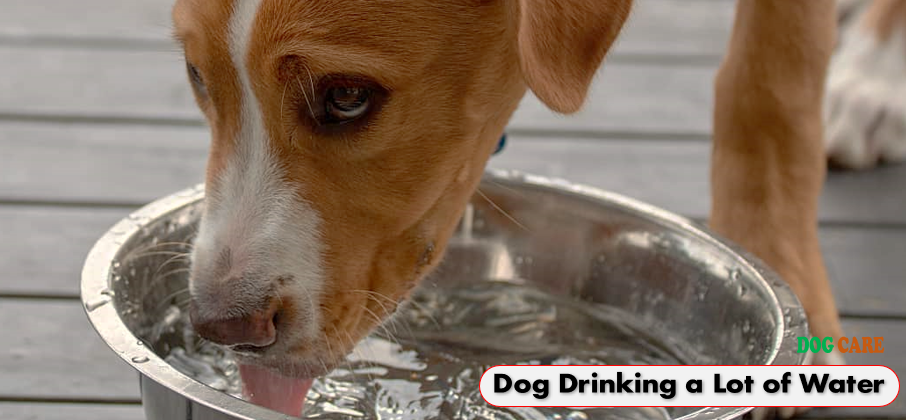If your Dog Drinking Lots of Water Suddenly and Vomiting, it could be a sign of a medical issue and you should consult a veterinarian. This behavior could indicate conditions such as diabetes, kidney disease, or an infection.
Rapid water intake and vomiting may also be caused by dietary indiscretion, where a dog consumes something they shouldn’t have. It is important to seek professional advice to determine the underlying cause and appropriate treatment for your dog’s symptoms. Ignoring these signs could lead to serious complications and worsen your dog’s condition.
Remember to always prioritize your pet’s health and well-being.

Reasons For Increased Water Consumption
There can be a number of reasons why your dog is suddenly drinking lots of water and vomiting. It’s important to understand these potential causes in order to provide the best care and attention to your furry friend. Some of the common reasons for increased water consumption in dogs include:
Dehydration
Dehydration can happen for various reasons, such as excessive activity, hot weather, or illness. It occurs when your dog loses more fluids than they take in. Signs of dehydration include excessive thirst, dry gums, and lethargy. If your dog is dehydrated, they may drink more water to compensate. However, if vomiting is also present, it can further worsen the dehydration. In cases like this, it’s vital to seek veterinary attention immediately.
High Sodium Or Protein Intake
Excessive intake of sodium or protein in your dog’s diet can result in increased water consumption. Foods that are high in sodium can cause your dog to become thirstier, leading them to drink more water. Additionally, protein-rich diets can increase water intake as well. While protein is essential for dogs, excessive amounts can lead to increased water consumption and potentially put strain on their kidneys. Ensuring a balanced and appropriate diet for your dog is key in maintaining their overall health.
Diabetes
Diabetes can also be a reason for increased water consumption in dogs. This metabolic disease affects the body’s ability to regulate blood sugar levels. In diabetic dogs, excess glucose in the blood ends up in the urine, pulling water along with it. As a result, dogs with diabetes tend to drink more water in an attempt to replace the lost fluids. If you notice your dog is excessively thirsty and urinating more frequently, it’s important to consult with a veterinarian as diabetes requires proper management and treatment.
Urinary Tract Infection
A urinary tract infection (UTI) can cause your dog to drink more water than usual. UTIs occur when bacteria enter and infect the urinary tract, leading to inflammation and discomfort. Increased water consumption can help flush out the infection-causing bacteria from the urinary tract. Along with increased thirst, other signs of a UTI in dogs may include frequent urination, straining during urination, and accidents in the house. If your dog shows these symptoms, it’s crucial to have them evaluated by a veterinarian for appropriate diagnosis and treatment.
Dog Drinking Lots Of Water Suddenly And Vomiting
Potential Causes Of Vomiting
When your dog starts drinking lots of water suddenly and vomits, it can be a concerning issue that requires attention. Vomiting in dogs can occur due to various reasons, and understanding the potential causes can help you identify the underlying problem more effectively.
Gastrointestinal Obstruction
Gastrointestinal obstructions can commonly lead to vomiting in dogs. When an obstruction occurs within the gastrointestinal tract, it can prevent the normal movement of food and water, resulting in vomiting. Common causes of obstruction include ingesting foreign objects such as toys, bones, or even certain materials like fabric.
Food Allergies Or Intolerance
Food allergies or intolerance can also be a potential cause of vomiting in dogs. Some dogs may exhibit an adverse reaction to certain ingredients in their diet, leading to gastrointestinal upset and subsequent vomiting. Dairy products, wheat, soy, and certain protein sources are known to cause allergies or intolerance in dogs.
Ingestion Of Toxic Substances
Dogs are naturally curious creatures, and their tendency to explore their surroundings sometimes leads them to ingest toxic substances. Consumption of toxic plants, household chemicals, medications, or human foods that are toxic to dogs can cause vomiting as their bodies attempt to expel the harmful substances. It is crucial to ensure a dog-friendly environment and keep hazardous items out of their reach.
In conclusion, understanding the potential causes of vomiting in dogs, such as gastrointestinal obstruction, food allergies or intolerance, and ingestion of toxic substances, can help pet owners take appropriate action when their dog exhibits these symptoms. If you notice any unusual behaviors or persistent vomiting, it is always best to consult a veterinarian for a proper diagnosis and treatment.
When To Seek Veterinary Attention
When it comes to our furry friends, we always want to ensure their well-being. If you notice that your dog is drinking lots of water suddenly and vomiting, it might be cause for concern. While occasional vomiting is common, persistent behavior coupled with excessive water intake may indicate an underlying health issue that requires veterinary attention. It’s crucial to pay attention to signs of discomfort, changes in eating habits, and other red flags that may warrant a visit to the veterinarian.
Persistent Behavior
Dogs are known to have occasional vomiting episodes, typically caused by dietary indiscretions or minor stomach upset. However, if your dog continues to exhibit the behavior of drinking an excessive amount of water and vomiting persistently, it could be an indication of a more serious problem. Persistent behavior refers to a recurring pattern over multiple occasions, rather than a one-off incident.
Signs Of Discomfort
Pay close attention to any signs of discomfort your dog may display. This includes excessive drooling, panting, restlessness, pacing, or lethargy. These symptoms may suggest that your dog is experiencing pain or discomfort in their digestive system, potentially due to an underlying medical condition. If you notice any of these signs, it’s essential to seek veterinary attention to determine the cause and provide appropriate treatment.
Change In Eating Habits
Changes in your dog’s eating habits can also be a significant indicator that something is amiss. If your dog suddenly loses their appetite, experiences weight loss, or demonstrates reluctance to eat, it may be time to consult with a veterinarian. This change in behavior, combined with increased water intake and vomiting, could signify an underlying issue such as gastrointestinal problems or organ dysfunction.
Remember, if your dog is drinking lots of water suddenly and vomiting frequently, it’s essential to recognize these signs and seek veterinary attention promptly. By addressing the issue early on, you can ensure the best possible care for your furry friend and help prevent any potential complications that may arise.

Dog Drinking Lots Of Water Suddenly And Vomiting
Diagnostic Procedures
When your dog starts drinking lots of water suddenly and vomiting, it is essential to identify the underlying cause to ensure proper treatment. Diagnostic procedures play a crucial role in diagnosing the root of the problem. Your veterinarian may recommend several tests to accurately determine the cause of your dog’s symptoms. The most common diagnostic procedures used in these cases include blood tests, urinalysis, and ultrasound. Let’s explore each of these procedures in more detail.
Blood Tests
Blood tests are a valuable tool for veterinarians to assess your dog’s overall health and identify any potential underlying medical conditions. These tests measure different parameters in the blood, such as red and white blood cell count, liver and kidney function, glucose levels, and electrolyte balance. By analyzing the results of these tests, your veterinarian can get a comprehensive understanding of your dog’s health and detect any abnormalities that may be causing excessive thirst and vomiting.
Urinalysis
Urinalysis involves the examination of your dog’s urine to gather valuable information about their urinary system and overall health. During this procedure, a urine sample will be collected and analyzed for the presence of any abnormalities, such as bacteria, crystals, or blood. Additionally, urinalysis also provides insights into kidney function and can help detect conditions like urinary tract infections, renal diseases, or diabetes. By examining the urine of your dog, veterinarians can determine if any specific issues are contributing to your dog’s symptoms.
Ultrasound
Ultrasound is a non-invasive imaging technique that uses sound waves to create real-time images of your dog’s internal organs. This procedure allows veterinarians to visually examine the organs, including the liver, kidneys, pancreas, spleen, and digestive tract, for any abnormalities or presence of masses. Ultrasound can be especially useful in identifying issues like tumors, inflammation, or obstructions that may be causing excessive thirst and vomiting in your dog. By observing the ultrasound images, veterinarians can gain valuable insights into the underlying cause of your dog’s symptoms.
Dog Drinking Lots Of Water Suddenly And Vomiting – Treatment And Prevention
If your dog is drinking lots of water suddenly and vomiting, it is important to seek appropriate treatment and take preventive measures. Here are some steps you can follow:
Fluid Therapy
A crucial aspect of treating your dog’s condition is fluid therapy. This involves providing your dog with adequate fluids to counteract dehydration. Your veterinarian may administer fluids intravenously to ensure your dog receives the necessary hydration.
Medication
In some cases, medication may be required to address the underlying cause of your dog’s symptoms. Your veterinarian will determine the appropriate medication based on their diagnosis. Antiemetics may be prescribed to control vomiting, while antibiotics may be necessary for bacterial infections.
Dietary Changes
Alongside fluid therapy and medication, dietary changes can play a significant role in your dog’s recovery and prevention of further episodes. Your veterinarian may recommend a bland, easily digestible diet that is gentle on your dog’s stomach. This may include boiled chicken or rice.
Additionally, it’s essential to ensure your dog always has access to fresh, clean water to prevent dehydration.
While these steps can be helpful, it’s crucial to consult with your veterinarian before implementing any treatment or preventive measures. They will provide personalized guidance based on your dog’s specific needs and medical history.
Frequently Asked Questions On Dog Drinking Lots Of Water Suddenly And Vomiting
Why Is My Dog Suddenly Drinking Lots Of Water?
Excessive thirst in dogs can indicate an underlying medical condition such as diabetes, kidney disease, or even heatstroke.
What Could Be The Reason For My Dog To Vomit After Drinking Water?
Vomiting after drinking water in dogs can be caused by various factors including gastrointestinal issues, food allergies, or the ingestion of something toxic.
Should I Be Concerned If My Dog Is Drinking More Water Than Usual?
Yes, increased water intake in dogs could be a sign of an underlying health problem, and it’s important to consult a veterinarian for a proper diagnosis.
How Can I Determine If There Is A Problem With My Dog’s Water Intake?
Monitoring your dog’s water intake by measuring the amount consumed daily and comparing it to their normal intake can help identify any potential issues.
What Steps Should I Take If My Dog Is Drinking Excessive Water And Vomiting?
If your dog is exhibiting these symptoms, it’s crucial to schedule a veterinary appointment to determine the cause and receive proper treatment for their well-being.
Conclusion
If your dog is suddenly drinking excessive amounts of water and experiencing vomiting, it could be a sign of an underlying health issue. It’s important to consult with your veterinarian to determine the cause and receive proper treatment. Keep an eye on their water intake and monitor their behavior for any other worrisome symptoms.
Prompt action can help ensure your furry friend’s well-being and happiness.


